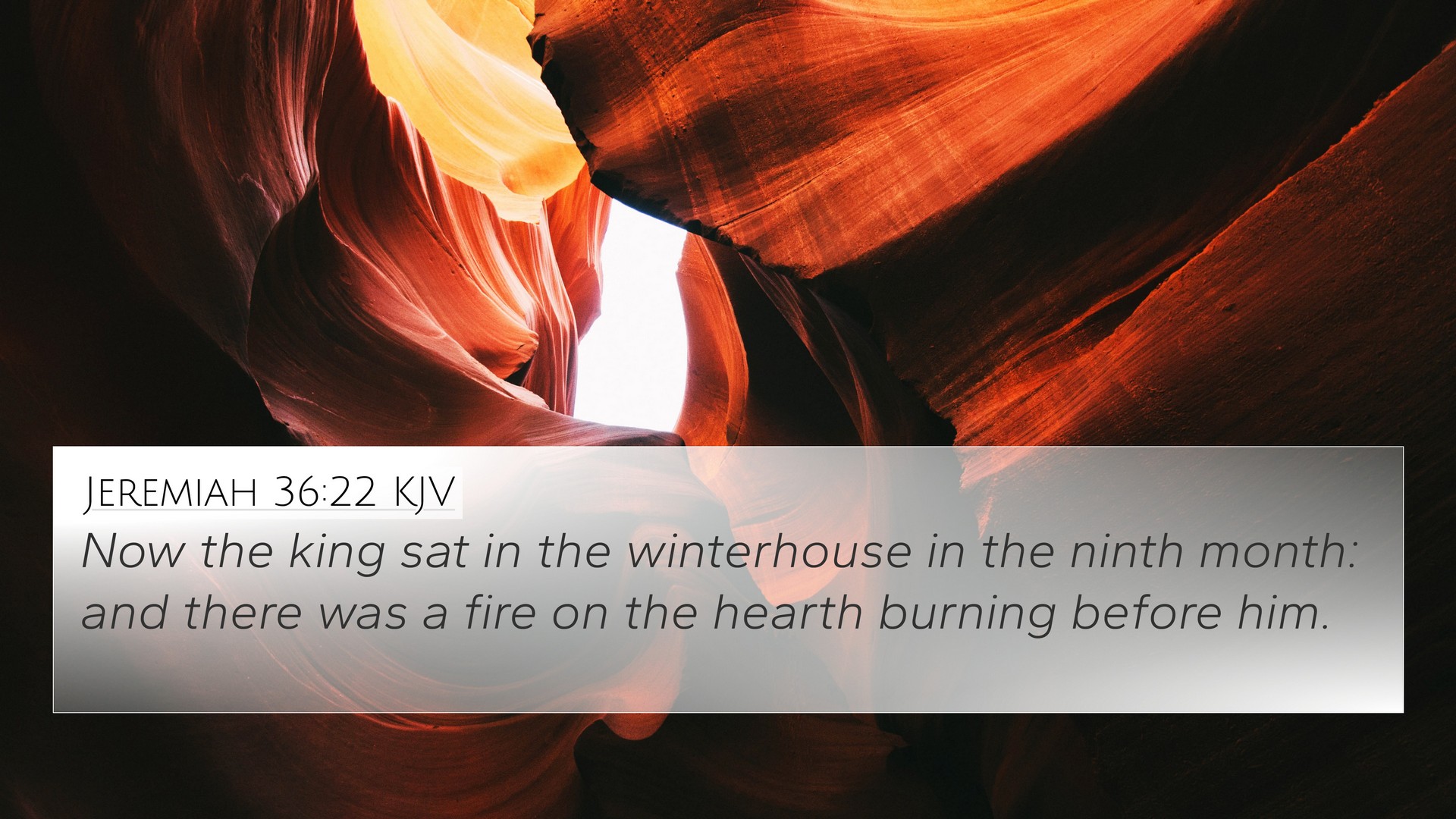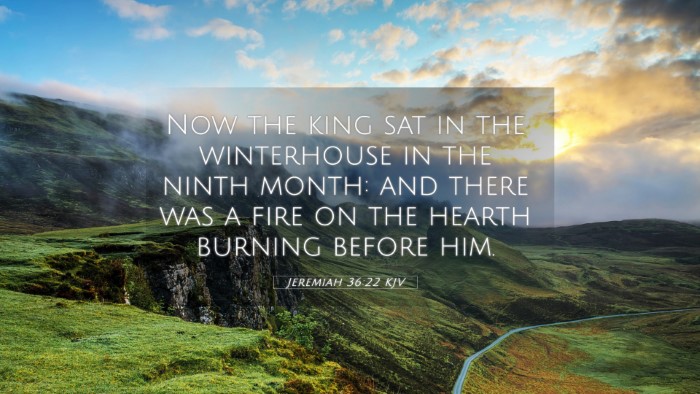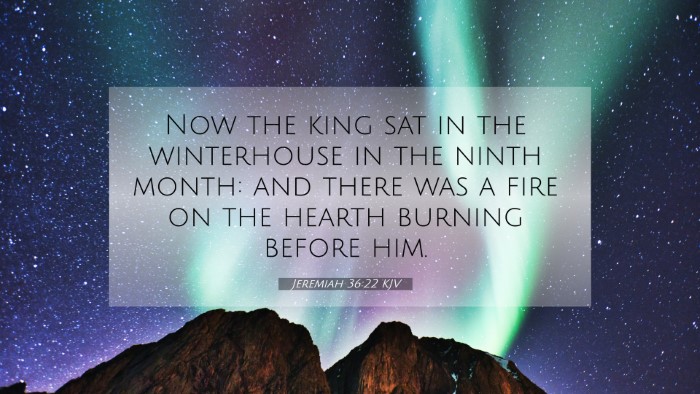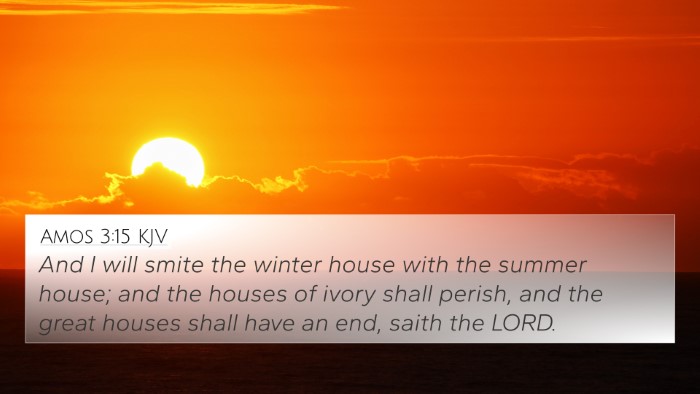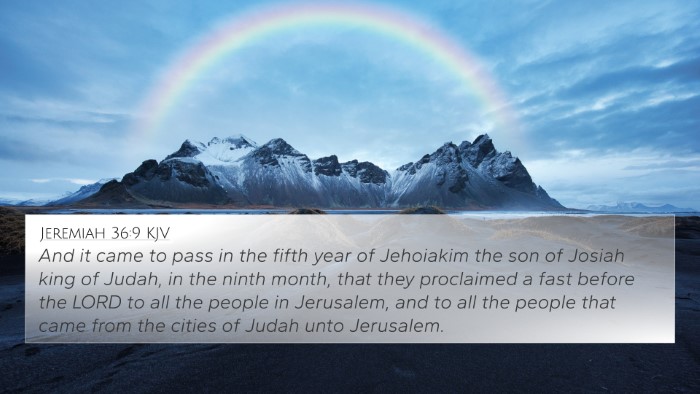Understanding Jeremiah 36:22
Verse: "Now the king sat in the winter house in the ninth month: and there was a fire on the hearth burning before him."
Jeremiah 36:22 presents us with a vivid image of King Jehoiakim in his winter house during a cold season. The warm fire before him contrasts sharply with the critical message about to unfold, and this setting is significant in understanding the spiritual implications of the king's actions.
Summary of Insights
This verse encapsulates the moment of tension where the warmth of the physical environment is contrasted by the coldness of the heart concerning God’s message being delivered through the prophet Jeremiah. The various commentaries provide rich details that contribute to a comprehensive understanding of this passage.
Matthew Henry’s Commentary
Matthew Henry notes that Jehoiakim’s choice to remain unaware of the divine warnings serves as a stark reminder of the consequences of ignoring God’s word. By sitting in his winter house, he is in a place of comfort, yet this comfort is misguided when juxtaposed with an impending judgment from God. The fire symbolizes temporal wealth and security, yet it is impotence against the spiritual challenges before him.
Albert Barnes’ Commentary
Albert Barnes emphasizes the significance of the timing mentioned—“in the ninth month.” This situates the events within a season of reflection and potentially, of solemnity within the Jewish calendar. The warmth of the fire is a metaphor for earthly comforts that can lead one away from recognizing and responding to God’s harsh truths. Barnes reiterates that Jehoiakim's disregard for the message should serve as a warning to all who are tempted to seek comfort over spiritual truth.
Adam Clarke’s Commentary
Adam Clarke highlights the historical context of the verse, noting that Jehoiakim was experiencing a false sense of security while serious prophetic messages were reaching him. The conflagration near him is a stark image of warmth amid impending doom. Clarke draws parallels to the importance of being attentive to God’s message, especially when one finds themselves in comfort zones that cushion them from spiritual urgency.
Cross-Referencing Biblical Texts
Jeremiah 36:22 is intricately connected to several other scriptures that illuminate its themes. Below are notable biblical cross-references:
- Jeremiah 1:17: God’s command to Jeremiah to be bold and deliver His messages despite opposition.
- 2 Kings 23:36-37: Contextualizes Jehoiakim's reign and his corrupt leadership leading to the eventual downfall of Judah.
- Isaiah 30:9-10: Reflects Israel's rejection of prophetic words, paralleling Jehoiakim’s attitude.
- Ezekiel 2:3-5: Directs God’s task for Ezekiel, showing a persistent theme of prophetic defiance from leadership.
- Jeremiah 25:3-7: A divine appeal to the people of Judah concerning their rebellion and the consequences ahead.
- Psalm 1:1-2: Contrast between the blessed man who delights in God’s law versus those who stand in the way of the ungodly, reflecting Jehoiakim’s choices.
- Lamentations 3:40-42: Call to examine ways and return to God, a reminder of the consequences evident in Jehoiakim’s reign.
Thematic Connections
This verse speaks profoundly within the themes of prophetic warning, human complacency, and the dire need for spiritual awakening. It compels the reader to acknowledge the necessity of aligning one’s life with God’s will despite the distractions of earthly comforts.
Practical Applications
For those studying this verse, several methods can enhance understanding:
- Use a Bible Concordance: To find related themes and words in scripture that can provide depth to the study of Jeremiah.
- Engage in Cross-reference Bible Study: Utilize tools designed for linking scriptures to see how various passages illuminate this verse.
- Explore Bible Chain References: Delve into connected verses that unravel the contextual narrative of God’s message through Jeremiah.
- Investigate the Historical Context: Understanding Jehoiakim’s reign can provide insight into the importance of this prophetic warning and its relevance today.
Conclusion
Jeremiah 36:22 serves not only as a historical account but also as a timeless reminder that one must not become comfortable or complacent in spiritual matters. Through the insights provided by Matthew Henry, Albert Barnes, and Adam Clarke, we see a compelling call to heed God’s warnings and respond to His truth. This study highlights the value of cross-referencing biblical texts, which deepens the understanding of Scripture, allowing one to draw meaningful connections across the Bible.
Through the lens of cross-referencing, the complexities of Jeremiah’s prophecy become more accessible, offering profound lessons applicable to our lives today.
